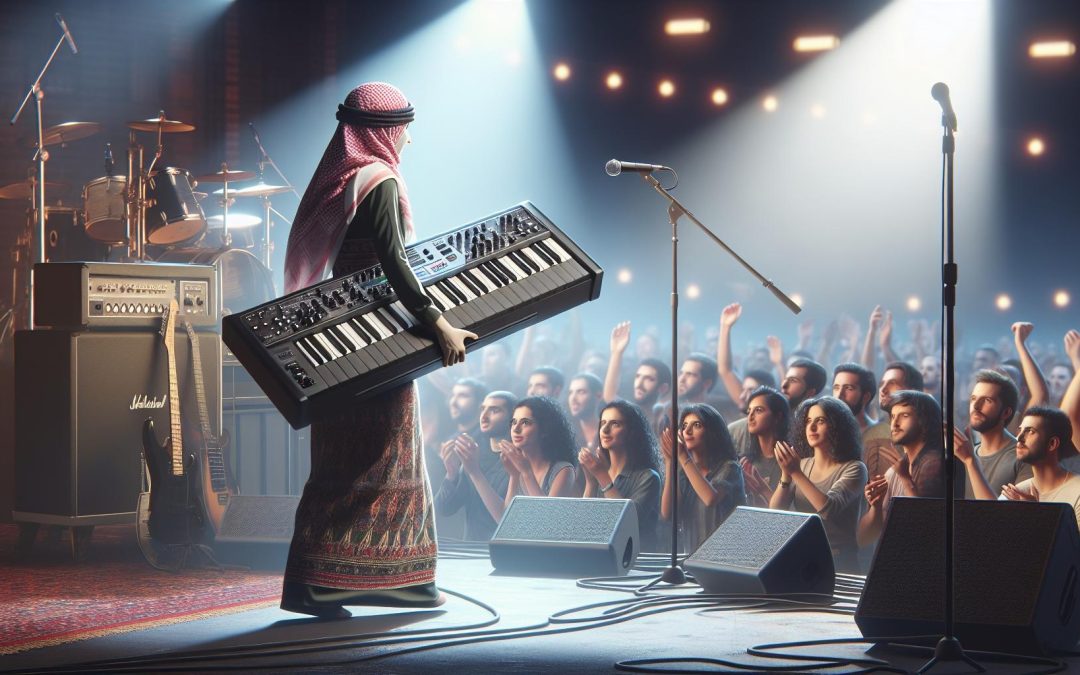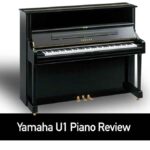If you're a gigging keyboardist, you know how crucial it is to have a compact and lightweight piano keyboard. It's not just about the sound - it's about ease of transport, quick setup, and the ability to adapt to different performance environments.
In the world of music, where gigs can pop up anywhere from a cozy coffee shop to a sprawling outdoor festival, having the right gear matters. A compact and lightweight piano keyboard can be a game-changer.
Let's dive into the world of portable keyboards, exploring the features that make them gig-worthy and the top models that professional musicians swear by. Whether you're a seasoned pro or just starting out, this is the guide you've been waiting for.
What to Look for in a Compact and Lightweight Piano Keyboard
When it's time to shop for a compact and lightweight piano keyboard, there are several essential aspects that should grab your attention. These features will make your life on the road—or even just moving from home to studio—a whole lot easier.
Weight and Size are the first elements that come to mind. As a gigging keyboardist, you'll appreciate something that's compact and light enough to transport without too much hassle. But remember that smaller doesn't always mean better. The balance between lightweight design and playing functionality should be considered. After all, you don't want to compromise the overall feel and comfort of playing.
The Number of Keys on the keyboard is crucial. Some suggest a minimum of 61 keys for a balanced experience, while others recommend going for 73 or 88 keys if your music demands more range. It's important to find a key count that suits your requirements and style of play.
Sound Quality shouldn't be overlooked. Smaller size might sometimes mean dropping a few tones or sound effects. But the keyboard you choose should consistently produce top-notch audio regardless of its dimensions.
Durability is an important factor too. Your keyboard needs to withstand the rigors of regular transportation and performance. Look for rugged build quality so that even if it's compact, it can endure the hustle of nightly gigs.
Ease of Connectivity is another key factor. It should have essential ports and jacks for simple plug-and-play capability with amplifiers, sound systems, or recording devices. Some keyboards come with built-in Bluetooth or wifi for wireless connections which could be a convenient option.
The Battery Life of portable keyboards can vary greatly. If you plan on using your keyboard for extended periods, ensure it has enough juice to last the entire gig. Or at least have options for easily recharging or changing batteries on the go.
Are these the only things you need to think about when shopping for your next gigging keyboard? They're certainly crucial factors, but depending on your unique needs, there might be more to consider. For example, the range of tones and rhythms available or built-in recording functionality could be important too. Still, these points are a great place to start.
Portability Features to Consider
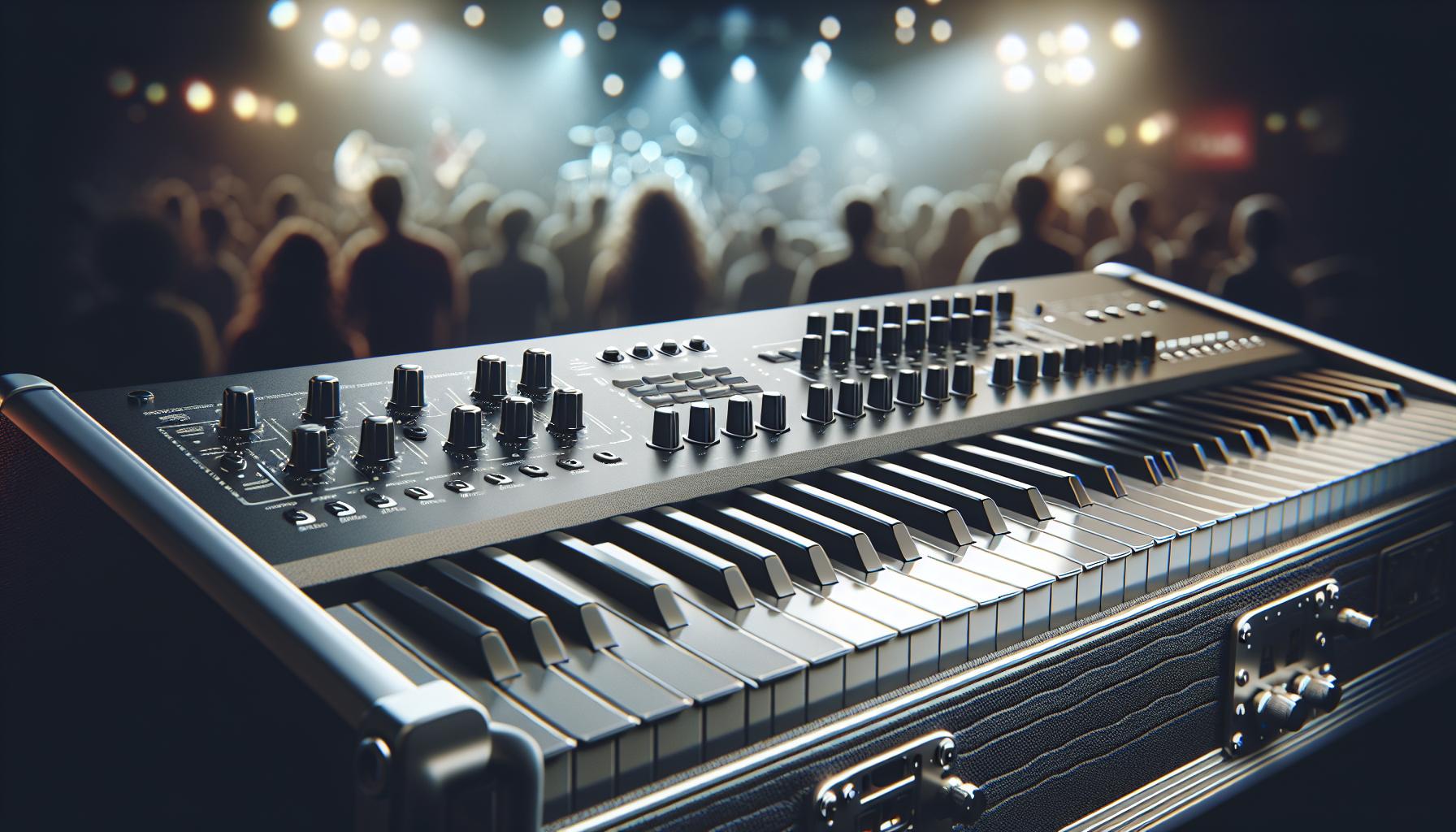
When on the hunt for the perfect compact and lightweight piano keyboard, there's a few key portability features that should be on your radar.
Size and weight are probably the first things that come to mind. It's gotta be compact enough to fit in tight gigging spaces and light enough that it won't break your back hauling it around town. Check the product specs before you buy!
The number of keys on the keyboard matters too. Sure, a 61-key keyboard is a lot more portable than a full-sized 88-key one. But if the music you're playing requires a full range, you might have to compromise on portability.
Sound quality shouldn't be sacrificed for portability. When you're rocking the keys, you want a keyboard that can produce rich and full sounds. Look for models with higher quality built-in speakers.
Next up is durability. Your keyboard should be able to endure the wear and tear of travel and performance. Consider models with a rugged build and tough exterior casings.
Connectivity becomes critical for live performances. You need a keyboard that can easily connect to a sound system. Look for models with a variety of connection ports, such as USB, MIDI, and audio out.
Lastly, consider battery life. If your gigs often lack access to power outlets, consider a keyboard that can run on batteries. Keep in mind, though, that battery power should last long enough for your entire performance.
While these aspects are important, remember that individual needs may vary. You know your music best: performance style, gear requirements, and travel conditions. Keep all these factors in mind as you weigh the pros and cons of each model.
Key Considerations for Gigging Keyboardists
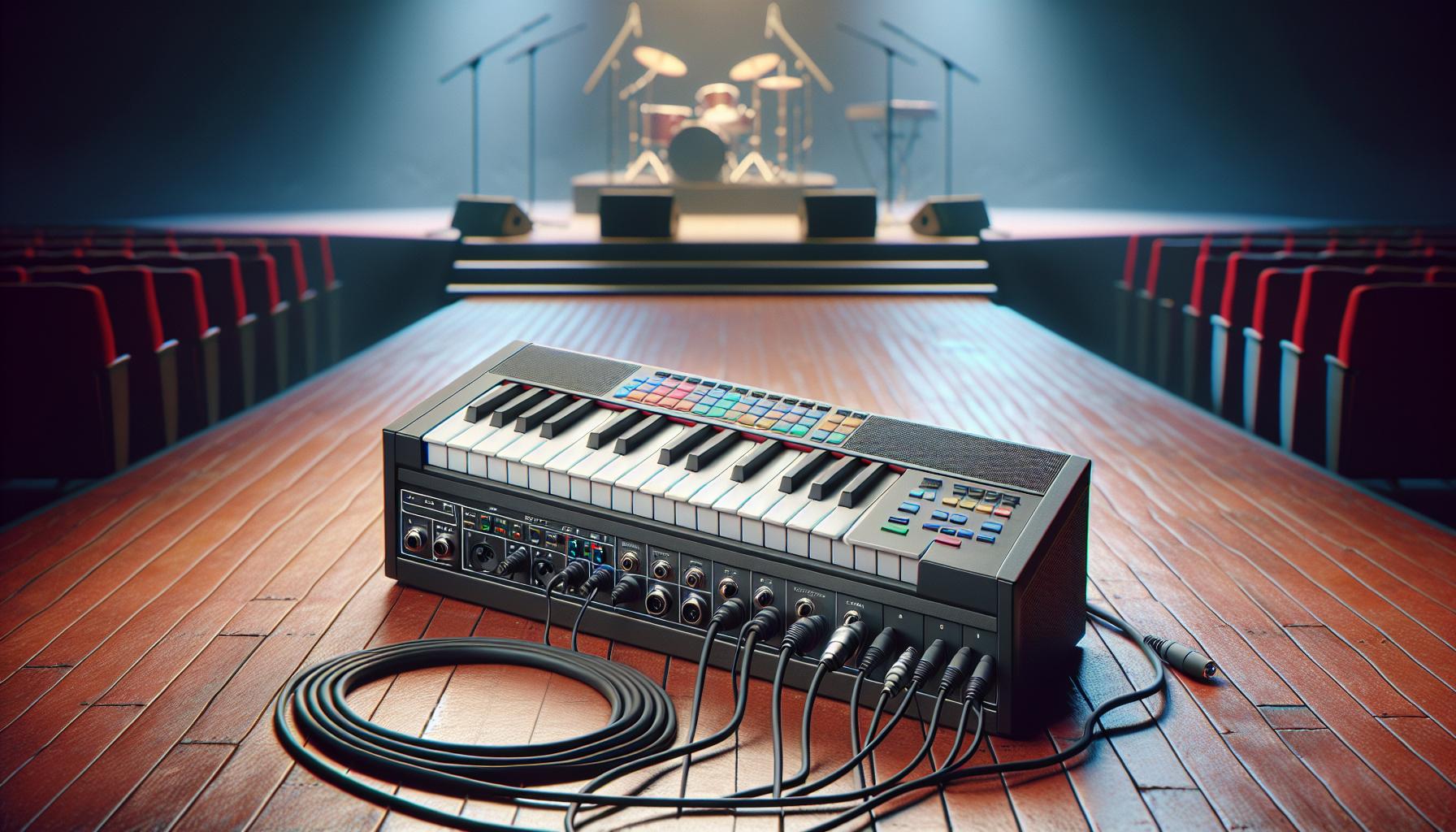
When it comes to selecting a lightweight, compact keyboard for gigs, not just any keyboard will do. There are several key elements that gigging keyboardists should take into account to ensure they're making the most optimal choice.
Size and Weight
Compact size and lightweight design are a given when lugging gear between gigs. No one wants to be burdened with a heavy, clunky keyboard that's difficult to transport. Few things you should consider:
- How much space is available in the van or vehicle?
- What's the distance between parking and the venue?
- Will stairs or other obstacles be a factor?
Number of Keys
It's not always a simple case of 'the more the merrier'. Yes, the standard piano comes with 88 keys but it may be too bulky for a gig. Consider opting for a keyboard with 76, 61, or even fewer keys if portability outweighs the need for range.
Sound Quality
While a compact, lightweight design is important, the sound quality should not be compromised. Both the quantity and quality of sound samples are important factors in creating an authentic piano sound.
Durability
Your keyboard will likely go through lots of unpacking and packing, moving around, and potentially some bumps here and there. Durability is key — figuratively and literally.
Connectivity
Most compact keyboards offer a variety of connectivity options. Consider the range of devices you might want to connect. This could include a tablet, smartphone, or laptop for programming sounds, or an external sound module for increased audio flexibility.
Battery Life
A keyboardist on the go needs a keyboard that doesn't quit mid-show. Consider a model with long battery life, or better yet, one that also works off mains power.
Of course, every gigging keyboardist has different needs. While these are general considerations, it's crucial to keep your specific situation, performance style, and gear requirements in mind. Remember, even the most 'perfect' keyboard won't be much help if it doesn't align with the individual user's needs and conditions.
Top Models of Compact and Lightweight Piano Keyboards
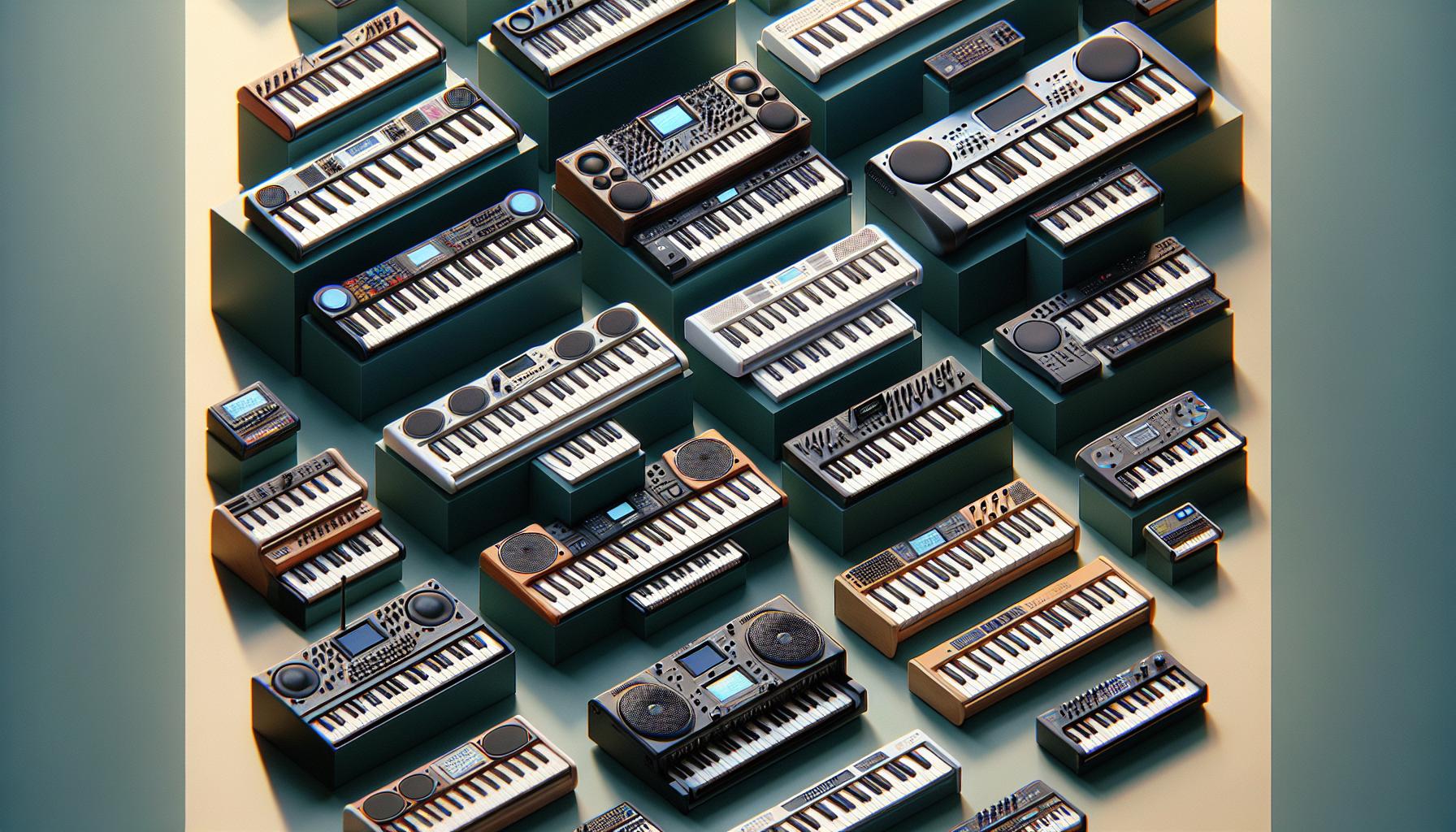
When it comes to combining compactness and lightness with excellent performance for gigs, a few keyboard models stand out. Let's take a peek at some of these top performers.
The Yamaha Piaggero NP12 surely deserves a mention. It's a 61-key beauty that weighs merely 4.5 kilograms. Don't let its featherweight fool you though. This keyboard packs a punch with its high-quality sounds and is popular for its portability. Moreover, its battery life spans up to 16 hours — a fantastic choice for gigging keyboardists who perform for extended periods.
Next in line is the Roland RD-88 Stage Piano, a slightly bigger model with 88 keys. Despite its bigger size, it's relatively light at 13.5 kilograms. Built with Roland's acclaimed SuperNATURAL sound engine, it delivers unrivaled sound quality. A bonus is the advanced onboard controller features, enabling seamless integration with other gear.
Korg KROSS 2, sporting 61 keys, is another top pick. Weighing just 3.8 kilograms, it's one of the lightest options. It surprises with a whopping battery life up to 7 hours and scores high on connectivity, offering a multitude of inputs and outputs.
Lastly, we have the Casio Casiotone CT-S200, an affordable yet feature-rich keyboard. Weighing only 3.3 kilograms, it's a 61-key option with a fantastic build quality, making it a great pick for the rough and tumble of the road.
Here's a quick overview of these models:
| Model | Number of Keys | Weight | Key Features |
|---|---|---|---|
| Yamaha Piaggero NP12 | 61 | 4.5 kg | High sound quality, Portable, Long battery life |
| Roland RD-88 Stage Piano | 88 | 13.5 kg | High-quality SuperNATURAL sound engine, Good connectivity |
| Korg KROSS 2 | 61 | 3.8 kg | Lightweight, Excellent connectivity, Long battery life |
| Casio Casiotone CT-S200 | 61 | 3.3 kg | Very light, Durable, Affordable |
Each of these keyboards shows how modern design and technology can answer the demand for compactness, lightness, and high performance in the world of gigging keyboards.
Pros and Cons of Compact and Lightweight Keyboards
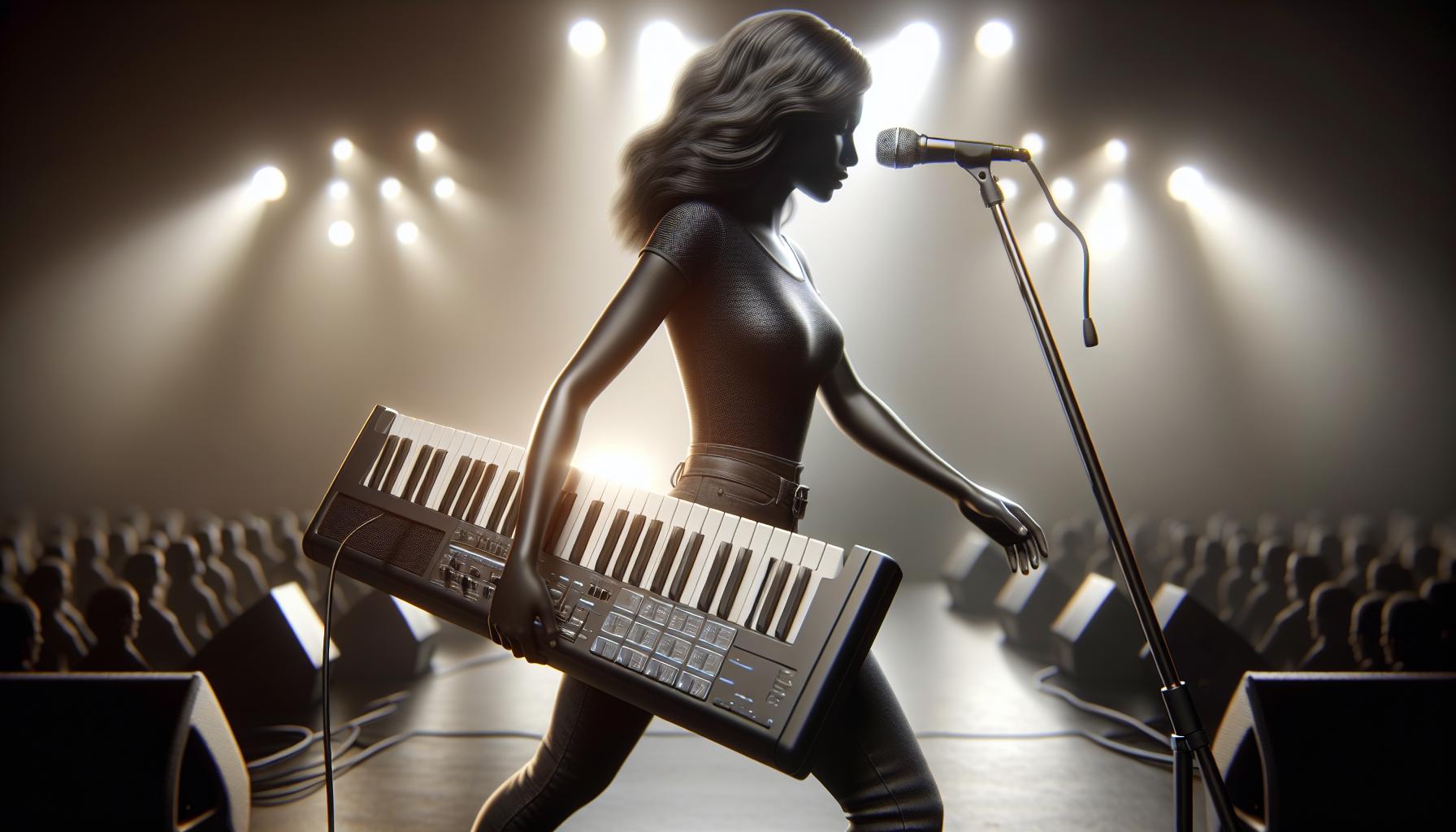
When it comes to considering the choice of equipment for gigging keyboardists, it's important to weigh the advantages and drawbacks. Let's take a closer look at some of the pros and cons of compact and lightweight keyboards.
In the realm of benefits, the portability factor should not be underestimated. Given their compact nature, these keyboards can be carried around easily, enabling musicians to transport without any hassle. For those who gig extensively, this flexibility is an indispensable asset.
Furthermore, these keyboards are not just lightweight and small, they're potent in terms of performance too. Despite their size, they come power-packed with diverse sounds, handy features, and an impressive battery life. So, no matter which model you go for, whether it's the Yamaha Piaggero NP12, the Roland RD-88 Stage Piano, the Korg KROSS 2, or the Casio Casiotone CT-S200, you're promised a high-functioning music maker.
Now coming to the cons, while compactness and lightness bring about the convenience of transport, they might compromise on the full range of a traditional piano. The keyboards could also feel less substantial and more plastic in comparison to higher-end models.
Moreover, some musicians might find that the smaller size and fewer number of keys limit their playability. Not all compact and lightweight keyboards feature weighted keys, a factor that can make a significant difference to the feel and touch of the instrument.
Each keyboardist's needs and preferences are different, and what works for one may not necessarily work for another. Keyboards should not just sound good and perform well, they should also feel comfortable and intuitive for the musician. Thus, it's always important to try out a keyboard before making a purchase decision.
Conclusion
So, it's clear that compact and lightweight piano keyboards can be a game-changer for gigging musicians. They're portable and pack a punch when it comes to performance. Sure, they might not offer the full range of a traditional piano and some may lack weighted keys. But that doesn't mean they're not worth considering. It's all about finding the right fit for your musical needs and preferences. Try out a few models, see what works for you. Remember, the perfect keyboard for gigs is out there waiting for you. It's just a matter of finding it.
Harlan Kilstein began playing piano during covid with no piano background at all. He taught himself how to play learning what to do and what not to do.
Today he's an advanced intermediate player and can help you grow in your skills because he learned all this on his own.

